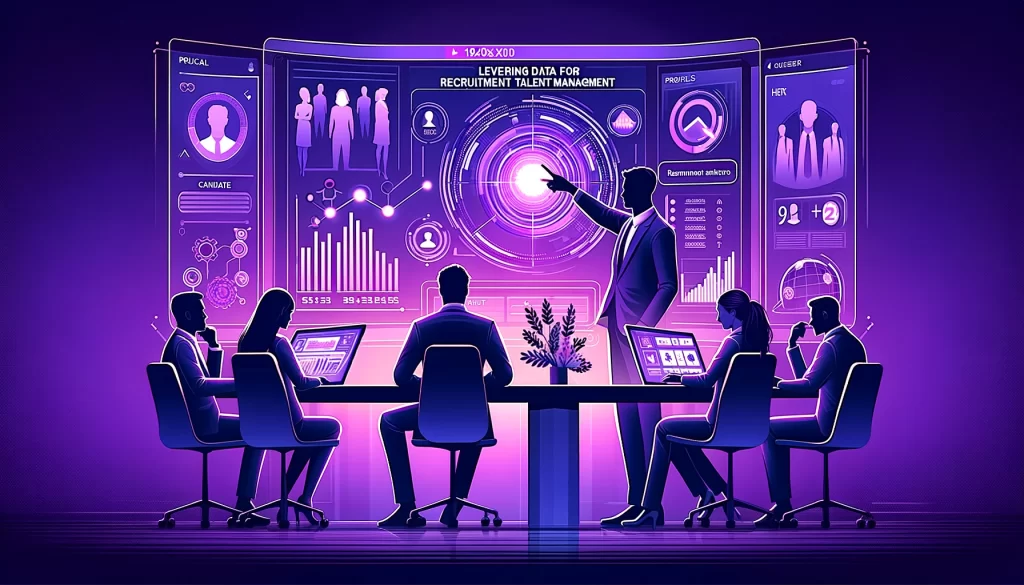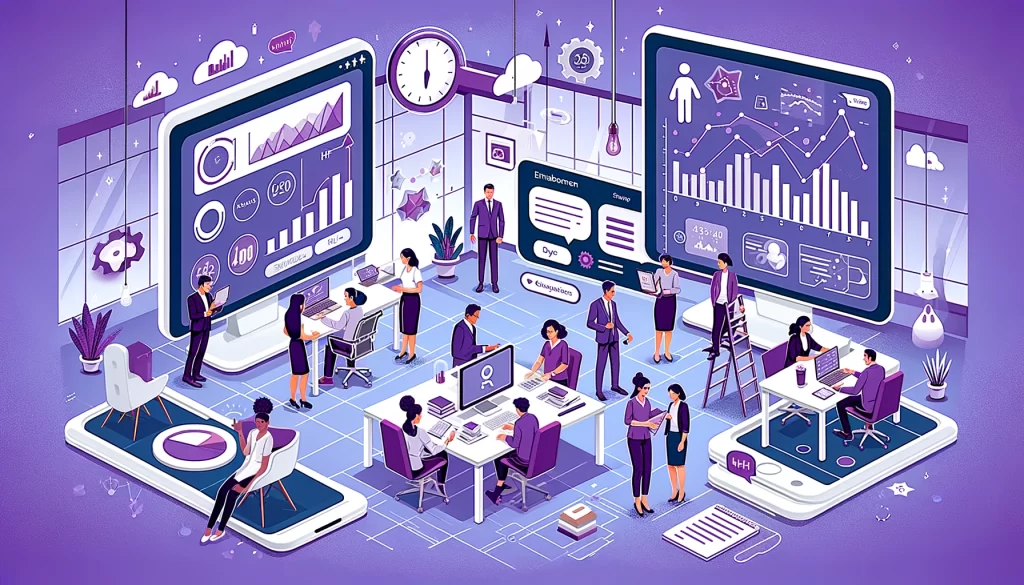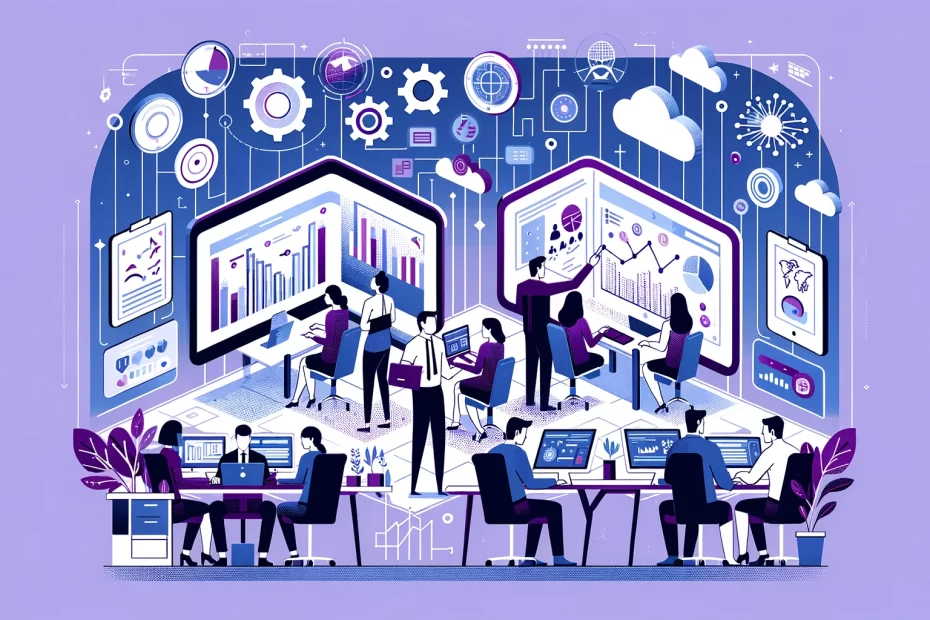When was the last time you confidently said, “Nah, I think our HR software gives us the data we need to effectively measure how our team is actually doing!”? If you’re like any of the HR and People Ops professionals we have spoken with, you’re probably not saying that.
Instead, many HR teams find themselves overwhelmed with data and lacking the resources to review and analyze it. Alternatively, they may have access to data, but it doesn’t paint a clear picture of the team issues they are trying to solve. In these cases, HR software can fall short of expectations, leaving HR professionals searching for more efficient and insightful solutions.
Fortunately, there is a growing recognition of the importance of data-driven HR solutions. With the right HR software, organizations can harness the power of data to make informed decisions, streamline processes, improve employee engagement, and enhance overall workforce management.
Key Takeaways:
- HR software should provide the data needed to measure team performance effectively.
- Many HR teams struggle to review and analyze the overwhelming amount of data they have.
- Some HR software fails to provide clear insights into team issues.
- Data-driven HR software can streamline processes, improve engagement, and enhance workforce management.
- Choosing the right HR software is crucial for obtaining accurate and actionable data.
Understanding the Power of HR Software
HR software, also known as a Human Resources Management System (HRMS) or Human Resources Information Systems (HRIS) are powerful tools that enables organizations to streamline their HR processes, increase operational efficiency, and improve overall management of human resources.
With employee management software, companies can automate time-consuming administrative tasks, such as employee data management, payroll processing, and benefits administration. This automation not only saves valuable time for HR professionals but also reduces the risk of errors and ensures compliance with relevant labour laws and regulations.
Furthermore, HR solutions provides a centralized platform for managing employee information, employee engagement including personal details, job histories, performance evaluations, and more. This centralized database makes it easier for HR teams to access and analyze data, enabling them to make data-driven decisions that align with organizational goals.
One of the key advantages of HR software is its ability to streamline the recruitment process. By leveraging recruitment software, HR professionals can efficiently manage job postings, track applicants, and streamline the interview and selection process. This not only improves the speed and efficiency of hiring but also helps to identify and attract the most qualified candidates.
Moreover, HR solutions play a crucial role in talent management. Through the use of a talent management system, companies can identify and nurture high-potential employees, develop succession plans, and create personalized career development paths. This helps to enhance employee engagement and retention, ultimately leading to a more motivated and productive workforce.
In addition to recruitment and talent management, HR software also offers performance management tools that enable organizations to set goals, track progress, provide feedback, and support employee growth and development. By providing data-driven insights into individual and team performance, HR software helps to optimize performance management processes and foster a culture of continuous improvement.
Table: Key Benefits of HR Software
| Benefit | Description |
|---|---|
| Streamlined HR processes | Automates administrative tasks, reduces manual errors, and increases efficiency. |
| Centralized employee data | Provides a single source of truth for employee information, making it easier to access and analyze data. |
| Data-driven decision-making | Enables HR teams to make informed decisions based on accurate and up-to-date data. |
| Improved recruitment | Streamlines the hiring process, improves candidate management, and attracts top talent. |
| Effective talent management | Identifies and develops high-potential employees, supports career development, and enhances employee engagement. |
| Optimized performance management | Provides tools to set goals, track performance, provide feedback, and support employee growth. |
In conclusion, HR software is a valuable asset for any organization looking to streamline HR processes, improve efficiency, and optimize human resources management. By leveraging the power of data and automation, HR software empowers HR teams to make strategic decisions, attract and retain top talent, and foster a culture of success.

Leveraging Data for Recruitment and Talent Management
Effective recruitment and talent management are crucial for building a successful workforce. With the advent of HR software, organizations now have the power to leverage data to optimize their recruitment processes and develop effective talent management strategies. By utilizing recruitment software and talent management systems, HR professionals can streamline their hiring efforts, track applicant information, and make data-driven decisions that drive organizational success.
Recruitment software empowers HR teams to efficiently manage job postings, attract top candidates, and streamline the entire hiring process. These systems provide a centralized platform to track applicant information, including resumes, qualifications, and interview feedback. With easy access to comprehensive applicant profiles, HR professionals can make informed decisions and ensure that the right talent is selected for each position.
In addition to recruitment, HR software plays a vital role in talent management. Organizations can use talent management systems to identify high-potential employees, develop career paths, and facilitate succession planning. These systems offer powerful analytics and insights that enable HR professionals to identify key skills gaps in their workforce and implement targeted training and development programs. By leveraging data, organizations can make strategic decisions and align their talent management strategies with their long-term business objectives.
Moreover, the software allows companies to analyze employee performance and identify top performers. This data-driven approach enables HR professionals to recognize and reward exceptional work, boosting employee motivation and engagement. By identifying performance trends and patterns, organizations can also proactively address any performance issues, provide necessary support, and foster a culture of continuous improvement.
Key Benefits of Leveraging Data for Recruitment and Talent Management:
- Streamlined recruitment processes for improved efficiency
- Enhanced candidate tracking and selection
- Identifying high-potential employees for career development
- Aligning talent management strategies with business objectives
- Improving employee performance and engagement
In summary, HR software offers a data-driven approach to recruitment and talent management. By utilizing recruitment software and talent management systems, organizations can optimize their hiring processes, track applicant information, and make informed decisions that lead to a strong and engaged workforce. The power of data in HR software cannot be underestimated, as it enables organizations to attract top talent, develop their employees’ skills, and align their talent management strategies with their overall business goals.

Enhancing Performance Management with Data-Driven Tools
Performance management is a critical aspect of HR that determines the success and growth of an organization. With the advancement of technology, employee engagement platforms have revolutionized the way performance management is conducted. By leveraging data-driven tools, HR software empowers organizations to assess employee performance objectively, set achievable goals, provide timely feedback, and support performance improvement initiatives.
The Power of Data in Performance Management
Data-driven performance management software enables HR professionals to make informed decisions based on objective information. By collecting and analyzing performance data, HR software provides a comprehensive view of an employee’s strengths, weaknesses, and areas for development. This holistic approach to performance management allows for fair and unbiased evaluations, fostering a culture of transparency and trust.
Setting Clear Goals and Expectations
HR software allows organizations to set clear and measurable goals for employees. Through the use of Key Performance Indicators (KPIs) and performance targets, HR professionals can align individual goals with organizational objectives. This not only helps employees understand what is expected of them but also provides a roadmap for their professional development.
Providing Timely and Constructive Feedback
In addition to collecting performance data, HR software facilitates timely feedback between managers and employees. By automating the feedback process, HR software ensures that feedback is consistent, constructive, and actionable. This enables employees to understand their strengths, identify areas for improvement, and take proactive steps to enhance their performance.
Supporting Performance Improvement Initiatives
HR software plays a crucial role in supporting performance improvement initiatives. By tracking and monitoring employee performance over time, HR professionals can identify patterns and trends that may indicate the need for additional training or development opportunities. With access to this data, organizations can proactively address performance gaps and provide the necessary resources to help employees succeed.
Efficiency and Impact of Data-Driven Performance Management Tools
The integration of data-driven tools in performance management software enhances efficiency and effectiveness. By automating manual processes and centralizing performance data, HR software eliminates administrative burdens and allows HR professionals to focus on strategic initiatives. Additionally, the use of data-driven tools enables organizations to make data-informed decisions, resulting in improved employee performance, increased productivity, and enhanced overall organizational success.
| Benefits of Data-Driven Performance Management Tools | How HR Software Enhances Performance Management |
|---|---|
| 1. Objective and unbiased evaluations | 1. Collecting and analyzing performance data for unbiased evaluations |
| 2. Clear goal setting and alignment | 2. Setting clear and measurable goals for employees |
| 3. Timely and constructive feedback | 3. Facilitating timely feedback between managers and employees |
| 4. Supporting performance improvement initiatives | 4. Identifying performance gaps and providing necessary resources for improvement |
| 5. Increased efficiency and productivity | 5. Automating manual processes and centralizing performance data |
Improving Employee Engagement with Insightful Analytics
Employee engagement plays a vital role in the success of any organization. It directly impacts productivity, satisfaction, and overall performance. To effectively enhance employee engagement, organizations need accurate insights and data-driven strategies. This is where employee engagement software and platforms come into play, along with people insight software integrated within HR software solutions.
Employee engagement software provides organizations with the tools they need to measure, analyze, and improve engagement levels within their workforce. By tracking employee sentiment, satisfaction, and feedback, organizations can gain valuable insights into areas that require attention and improvement.
With employee engagement software, organizations can utilize various analytics to gather key information about their workforce. They can identify trends, patterns, and correlations that impact employee engagement, such as communication channels, recognition programs, and work-life balance initiatives.
Moreover, people insight software within comprehensive HR software solutions enables organizations to gain a deeper understanding of employees’ needs, preferences, and motivations. It allows HR professionals to identify the drivers of engagement and develop tailored strategies to address them.
Through the integration of employee engagement software, platforms, and people insight software, HR software empowers organizations to foster a positive and engaging work environment. It enables targeted interventions, personalized initiatives, and evidence-based decision-making to enhance employee satisfaction, productivity, and overall organizational success.
Benefits of Employee Engagement Software and People Insight Software:
- Accurately measure and analyze employee engagement levels
- Identify areas for improvement and implement targeted strategies
- Understand employees’ needs, preferences, and motivations
- Develop personalized initiatives to enhance engagement
- Make data-driven decisions for effective workforce management
By utilizing employee engagement software, platforms, and people insight software, organizations can create a culture of engagement, improve employee satisfaction, and drive overall business success.
| Benefits of Employee Engagement Software | Benefits of People Insight Software |
|---|---|
| 1. Accurate measurement of engagement levels | 1. In-depth understanding of employees’ needs |
| 2. Identification of areas for improvement | 2. Insights into employees’ preferences and motivations |
| 3. Implementation of targeted strategies | 3. Personalization of initiatives to enhance engagement |
| 4. Data-driven decision-making for HR management | 4. Enhanced performance by addressing workforce drivers |
Maximizing Efficiency with Integrated HRIS Solutions
HR software with integrated HRIS (Human Resources Information System) capabilities is a powerful tool that can revolutionize HR processes and maximize efficiency within organizations. By centralizing employee data and automating administrative tasks, HRIS-enabled HR software streamlines workflows and simplifies HR management.
With an integrated HRIS solution, HR teams no longer need to manually maintain multiple spreadsheets or navigate through different systems to access employee information. All employee data, including personal details, employment history, performance evaluations, and training records, are stored in a centralized database. This not only eliminates data duplication and inconsistencies but also ensures data accuracy and security.
Administrative tasks, such as leave management, timesheet tracking, and employee onboarding, can be automated through the HRIS-enabled software. This automation reduces human errors, saves time, and allows HR professionals to focus on strategic initiatives rather than being overwhelmed by paperwork.
In addition to centralizing data and automating tasks, integrated HRIS solutions offer advanced reporting and analytics capabilities. HR professionals can leverage data insights to make informed decisions regarding workforce planning, talent management, and employee development. They can ideally identify trends, spot areas of improvement, and proactively address issues related to employee engagement, retention, and performance.
Sample Table
| HRIS Features | Benefits |
|---|---|
| Centralized employee data | Eliminates data duplication and ensures accuracy |
| Automated administrative tasks | Reduces human errors and saves time |
| Advanced reporting and analytics | Facilitates data-driven decision-making |
By adopting HR software with integrated HRIS capabilities, organizations can unlock the full potential of their HR functions. The streamlined processes, improved data management, and data-driven insights enable HR teams to enhance operational efficiency, boost employee productivity, and achieve strategic HR goals.
Wrapping Up…
Throughout this article, the importance of leveraging data-driven HR software for effective workforce management has been emphasized. HR software plays a pivotal role in streamlining HR processes, increasing efficiency, and improving overall management of human resources.
By utilizing HR software, organizations can optimize their recruitment processes and talent management strategies. Data-driven tools offered by HR software enable businesses to assess employee performance, set goals, provide feedback, and support performance improvement.
Moreover, HR software provides insightful analytics to track and analyze employee engagement levels. By identifying areas for improvement and implementing strategies to enhance employee satisfaction and productivity, organizations can create a positive work environment. Furthermore, with integrated HRIS solutions, HR software centralizes employee data, automates administrative tasks, and simplifies HR processes, maximizing efficiency.
In conclusion, the power of HR software lies in its ability to utilize data for informed decision-making, recruitment, talent management, performance management, employee engagement, and overall workforce efficiency. By embracing data-driven HR software, businesses can gain valuable insights, make data-informed decisions, improve processes, and ultimately create a thriving and engaged workforce.
FAQ
What is HR software?
HR software, also known as a human resources management system, is a technology solution designed to streamline HR processes, manage employee data, and optimize workforce management. It offers functionalities such as employee data storage, recruitment and talent management, performance management, employee engagement analytics, and HRIS integration.
How can HR software benefit organizations?
HR software can significantly benefit organizations by improving efficiency, reducing administrative burdens, enhancing decision-making, and increasing employee engagement. It allows HR departments to automate various tasks, optimize recruitment and talent management, track employee performance, and gain valuable insights into workforce trends and behaviors.
Can HR software help with recruitment and talent management?
Yes, HR software can be a valuable tool for recruitment and talent management. It enables organizations to streamline the hiring process, track candidate information, automate job posting and applicant tracking, and identify top talent. Additionally, it helps HR professionals develop effective talent management strategies, including performance evaluation, succession planning, and career development programs.
How does HR software support performance management?
HR software provides data-driven tools for performance management. It allows organizations to set performance goals, track employee progress, conduct performance evaluations, and provide continuous feedback. By leveraging these tools, organizations can identify areas of improvement, recognize top performers, and support the overall growth and development of their workforce.
Can HR software improve employee engagement?
Absolutely! HR software offers employee engagement software and platforms that enable organizations to measure and analyze employee engagement levels. By leveraging insightful analytics, organizations can identify potential areas of disengagement, implement targeted strategies to enhance employee satisfaction, and ultimately improve overall productivity and retention rates. This should also provide a benefit to a company’s overall workplace culture initiatives.
What is the advantage of using an HR software with integrated HRIS capabilities?
HR software with integrated HRIS capabilities centralizes employee data, simplifies administrative tasks, and increases overall efficiency. By consolidating various HR processes and information, such as payroll, benefits administration, time and attendance tracking, and employee records, organizations can automate workflows, reduce errors, and ensure compliance with HR regulations.
Why is data-driven HR software important for effective workforce management?
Data-driven HR software is crucial for effective workforce management because it enables organizations to make informed decisions based on accurate and real-time data. It enhances HR processes, improves recruitment and talent management strategies, facilitates performance evaluation, boosts employee engagement, and optimizes overall efficiency. By leveraging data-driven insights, organizations can create a thriving work environment and maintain a competitive edge in today’s dynamic business landscape

